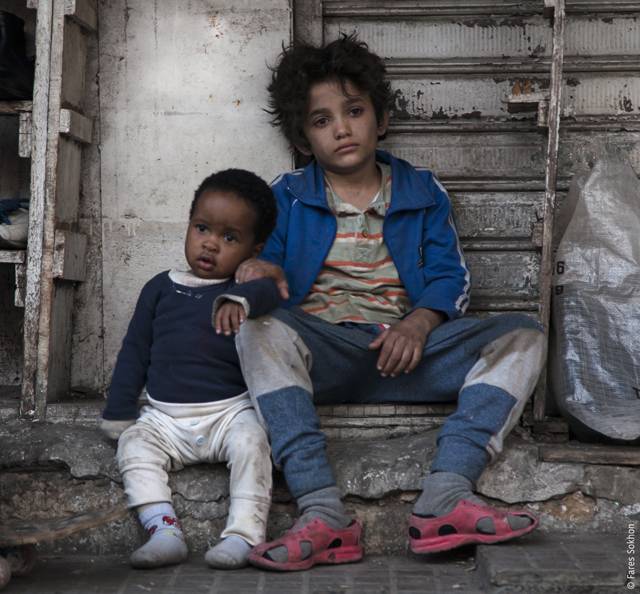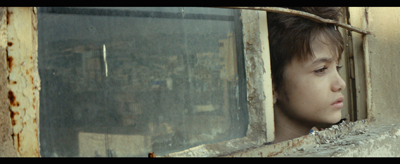Capharnaum Khaled Mouzanar Interview

Interview with Khaled Mouzanar
Cast: Zain Al Rafeea, Yordanos Shiferaw, Boluwatife Treasure Bankole
Director: Nadine Labaki
Genre: Drama
Rated: MA
Running Time: 123 minutes
capharnaüm (noun)
ca·phar·na·üm | \kəˈfärnēəm\
plural -s
Definition of capharnaüm: a confused jumble: a place marked by a disorderly accumulation of objects
Synopsis: Capharnaum is a socially charged neorealist parable of the will to survive and childhood ingenuity, charged with emotion interlaced with warmth and humour.
After being jailed for committing a violent crime, Zain, a mistreated 12-year-old boy, sues his parents for giving him life. Zain is part of a large family that lives hand to mouth in a crammed, crumbling apartment. The kids work instead of attend school as their parents cannot afford it. When his 11- year-old sister is sold into marriage out of desperation, Zain flees his troubled family in the hope of finding a better life. An illegal Ethiopian worker, Rahil, takes pity on Zain while he is wandering the streets begging. She takes him to her shanty house where she lives with her baby, Yonas, and lovingly cares for Zain in a way his parents never did. Zain is suddenly left as Yonas' sole caretaker when Rahil disappears, and is forced to resort to increasingly desperate measures to survive.
Director Nadine Labaki (Where Do We Go Now?) cast non-professional actors from backgrounds similar to their characters, resulting in authentic and extraordinary performances that you will not forget.
Capharnaum
Release Date: February 7th, 2019
Interview with Khaled Mouzanar (Producer)
Question: Is this the first time you have produced a feature film with Nadine?
Khaled Mouzanar: When I began to understand which way Nadine was going with Capharnaüm, her obsession with truth and her desire to push realism to its limits while exploring a social and human problem, it became clear to me that a classic production wouldn't be appropriate. This is how I came to produce the film, with a view to total freedom. The idea was to create a purely Lebanese film, pretty much free of any creative or time constraints, through which Nadine could express herself as she desired, at the crossroads of documentary and fiction. Capharnaüm is also the proof that we make a team and can do everything together.
 Question: You've described the making of the film as a sort of "home birth". Can you talk a little about that?
Question: You've described the making of the film as a sort of "home birth". Can you talk a little about that?
Khaled Mouzanar: Our professional and private lives overlapped completely during this whole period. Capharnaüm practically became a family epic, all the more so since its theme echoed the birth of our daughter shortly before we started filming. The two of us lived this film together, as you would an actual birth, with all the steps that implies: from the embryonic stage of the idea to the materialisation of images on the screen and later a kind of baby blues! We are physically connected to Capharnaüm, because we conceived it and made it in absolute freedom. Everything got going between our living room and my studio, before we set up an office just below our house. Even the actors, whose lives off camera resemble those of their characters in the film, became part of our day-to-day living. It's a barely-tamed film, one that emerged from our guts, and in which our DNA is deeply embedded.
Question: The production itself was unusual.
Khaled Mouzanar: Because of the complete freedom we allowed ourselves, Capharnaüm was an organisational nightmare on every level. The production breaks with all the usual rules. From the reading of the screenplay to post-production, music and mix, everything was done by us, at home. Neither was the financing put together conventionally. At the start I threw myself into this adventure with hardly any money, and apart from me, no one believed in the project. They told me it was a crazy poker game. The risks were colossal, but I believed in it profoundly. Capharnaüm was a truly reckless project; I reached financial lows that I forbade myself from sharing with Nadine, for fear of destabilizing her when it came to the shoot. Finally, funds were injected through an exceptional financial set-up, thanks to both the private sector and the Central Bank of Lebanon.
Question: How did Nadine's move to a more documentary style of film affect the music you produced?
Khaled Mouzanar: I asked myself incessantly what kind of music could correspond with all these characters' lives and all they have to say? What sound would fit the smell of drains, the poverty, the rawness of the subject? I inclined towards a less melodic score than usual. The idea was to accentuate the Mad Max side of things – almost mythological (despite all that reality) – that characterises the landscape of the film, and that I see as an allegory of the future of all large cities. This was achieved using dissonant choral melodies that seem to disappear before they can be grasped, as well as synth-based electronic sonorities. For that matter, one of the tracks, called The Eye of God, accompanies a shot of this city, more or less cursed, that seems doomed to this punishment: poverty without hope. What I absolutely didn't want was to underline or highlight emotions that were already sufficiently intense, but on the contrary, to strip back the scenes and establish a disturbing atmosphere for the audience, which is in some way brought face to face with its culpability for having been here and done nothing. The aim of the film is to shake up and to move the audience.
Question: Could we have a few words about this adventure, experienced both solo and as one half of a duo?
Capharnaum
Release Date: February 7th, 2019
MORE





